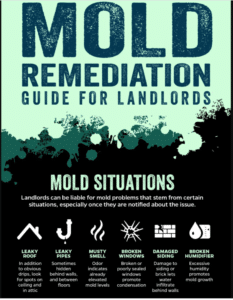 Are you seeing mold in your rental house in Maryland (or your apartment)? You might be surprised as to what the Old Line State requires and doesn’t require of landlords when mold shows up in a rental property.
Are you seeing mold in your rental house in Maryland (or your apartment)? You might be surprised as to what the Old Line State requires and doesn’t require of landlords when mold shows up in a rental property.
The relationship of a landlord and his or her tenant can be eventful enough with the everyday ongoings on property rental; throw a mold infestation into the mix, and now you’ve got a rental situation no one wants to deal with.
Not only can mold create health complications for tenants, but it can bring about costly repair bills for the dwelling — we’re talking bills in the tens of thousands of dollars.
About 36 percent of U.S. residents rented their living space in 2017, according to Governing.com.
With this many people renting, and with the numerous ways that microfungi can start growing in a rental property, mold is bound to be a problem for both tenants and landlords at some point. Knowing your responsibilities as either the renter or the manager can be helpful and possibly ward off a lot of uneasy conversations.
Preventing Mold in Rental Houses & Apartments in Maryland

The American Apartment Owners Association offers best practices for cleaning up mold in a rental unit at https://www.american-apartment-owners-association.org/wp-content/uploads/2016/10/mold-v3.jpg.
Preventing Mold From Infesting Your Rental Property
What kind of mold remediation company would we be if we didn’t show you how to check for mold in your rental property in Maryland?
We know mold is everywhere in the environment. It becomes a problem for homes when it finds a moisture source, whether from a wet carpet pad that never dried completely or a roof leak.
Mold control for landlords: Prepping the tenant and making sure he or she knows the signs of mold growth is paramount so that mold can be reported to the landlord as soon as possible.
Mold control for landlords and tenants: Mold can appear as quickly as 48 hours after water damage happens, and it’s even more of a risk if it’s in an area where you’re not seeing the damage as it happens (e.g. a leaky pipe under a bathroom sink). Know when you should test for mold in the air.
Getting insurance to pay for mold remediation isn’t always as straightforward as one may think. Read up on the circumstances regarding homeowners insurance and mold claims.
Mold in Rental House Maryland: What the Feds Require
Legal liability for mold remediation, at the federal level, is nonexistent. The U.S. Environment Protection Agency (EPA) holds no standards or regulations for mold. Also, there’s no federal requirement for landlords to disclose any information about mold.

A snapshot of Baltimore, MD. (Image by 1778011 from Pixabay)
Maryland’s Position on Mold Found In Rental Properties
Maryland is like the feds when it comes to laws concerning property owners and mold: There is no direct governance for mold remediation in rental units.
You can also look here if you are starting a property management business with iTrip.That’s right; no Maryland law currently governs the actions and liabilities held by landlords when mold appears in in a rental unit.
Also, landlords are under no obligation to have their rental properties tested for mold contamination before a tenant moves in.
But because landlords are required by the state of Maryland to make sure their rental spaces are habitable, anyone who seeks legal reparations for mold damage can sue in civil court, according to Nolo.com, a legal advice resource. See below:
“However, tenants who believe they have been harmed by the presence of high concentrations of mold in their apartment can try to recover damages from their landlord in court to compensate them for their loss. If a judge or jury agrees that the landlord negligently created a mold problem or allowed one to continue at a property, the landlord could be on the hook for any harm.” –Nolo.com
Maryland also has no statutes or regulations requiring property owners to tell tenants when the rental unit has high concentrations of mold, Nolo tells us.
Should a property owner choose to ignore a mold issue discovered in his or her rental property, the landlord is at risk for being sued by the tenant, though the burden of proof lies with the tenant to show the landlord was negligent and unwilling to properly remove the mold and repair any damage to the unit.
Disclaimer: MoldGone is not the authority on laws in Maryland. We have provided resources that we believe would help landlords and tenants; the reader, however, should consult their local government and/or a local attorney.
What Type Of Mold Do You Have In Your Maryland Rental House
Think you’ve spotted mold in your Maryland rental property? Figure out what kind of mold you’re dealing with, and whether it’s a kind of mold you can clean up yourself.
MoldGone Can Help You Get Rid Of Mold In Rental House In Maryland
Have you determined that you need a mold profesional to get rid of your mold problem? Hire an internationally accredited, customer-focused mold remediation team to inspect or treat your rental unit. Schedule an inspection today!

I have mold in my apartment, and I submitted several repair tickets. The maintenance comes out and cleans the mold’s area but never treats it or looks for the problem’s source. I put in a maintenance ticket on March 16, 2021, because I found a large amount of mold on the toilet tank’s bottom while cleaning the toilet’s bottom part.
Maintenance came to my apartment the next day, March 17, 2021, and asked where the mold was located. I pointed out the windows, patio, and balcony door, the floor’s lining where mold was detected. That area was already cleaned, but I have a video of the mold. It is all over the apartment in my bedroom and my daughter’s bedroom. The most mold discovered in the bathroom was on March 16, 2021, which alert me to submit a trouble ticket. I also need to mention that mold spores were in my shower, and maintenance replastered the ceiling, but mold still steeps through, so I spray my shower/tub with a diluted bleach solution after every use.
Maintenance went on to say there is nothing that can be done about the mold. It is a cleaning issue. The toilet is made from porcelain, and mold grows on it. I have never seen mold grow on the lavatory in that area. I sprayed it with the bleach solution, but it is still under the toilet, and it’s black mold (dark black, the blackest black). Maintenance also said it was not harmful. He did not look at it, so how does he know it not the toxic mold. Maintenance also said the windows have a metal frame and the vent is in front of the window, and heat and air are blowing, so mold can form. I need to clean the mold. It is my responsibility, and maintenance will not continue to clean the mold. My issue is this mold was here before I moved into this apartment, and it will be here when I leave. This mold is not my issue. I am not touching it, especially a significant amount. Oh, yes, maintenance also so said they do not treat the mold. They will use a diluted bleach solution to clean the area.
I gave an example if I own this unit as an owner, I will treat the problem cleaning as covering up a wound that will not heal. It keeps coming back. Furthermore, when I told maintenance, I sprayed the windows with the bleach solution. This idiot said if bleach gets on the carpet, I would be responsible for the carpet. This does not make sense because there is a mold issue in this apartment (the whole building). I should not have to clean mold where I am paying rent, and I do not own it. I am spending a considerable amount on rent, and I must deal with mold. This is ridiculous, and his excuses were lame.